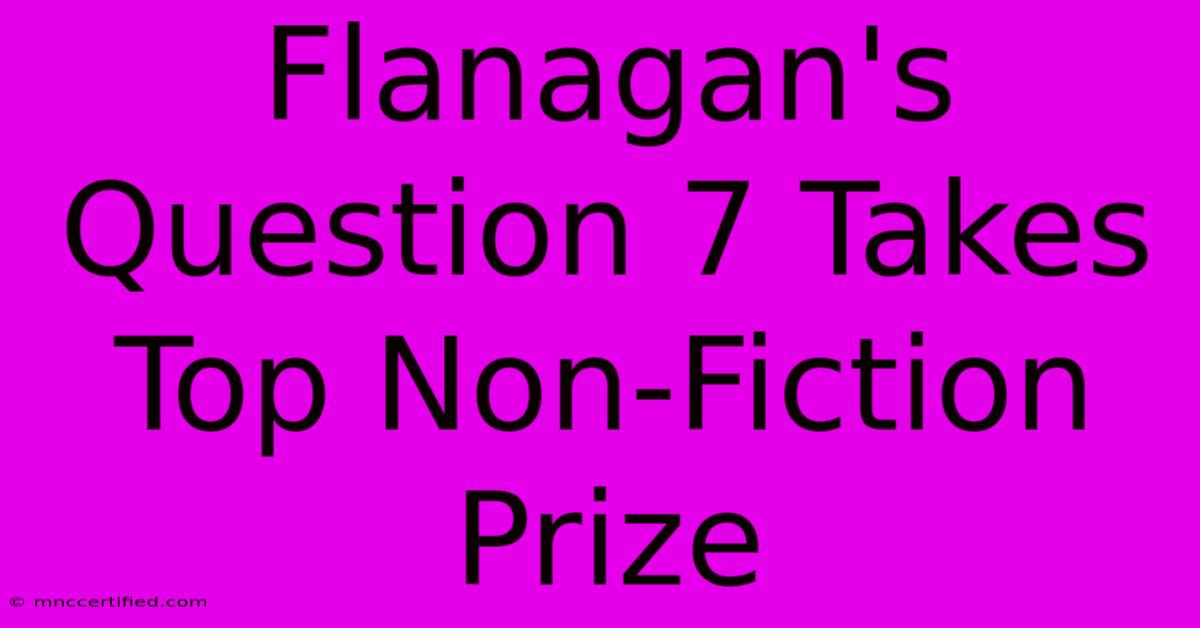Flanagan's Question 7 Takes Top Non-Fiction Prize

Table of Contents
Flanagan's Question 7 Takes Top Non-Fiction Prize: A Deep Dive into Literary Success
Richard Flanagan's Question 7 has achieved a significant literary milestone, claiming the top prize in the prestigious [Insert Name of Award Here] for Non-Fiction. This win marks a significant moment not just for Flanagan, but also for Australian literature on the world stage. This article delves into the reasons behind Question 7's triumph, exploring its themes, impact, and the broader significance of its award.
The Power of Questioning: Exploring the Themes of Question 7
Question 7, unlike Flanagan's acclaimed novels, tackles a crucial aspect of contemporary life: climate change and its devastating impact. The book doesn't shy away from the difficult truths of environmental destruction, presenting a compelling narrative that blends personal reflection with stark realities. Flanagan masterfully weaves together historical context with present-day anxieties, leaving the reader grappling with the urgent need for action. The "question" at the heart of the book isn't just a rhetorical device; it's a call to accountability, prompting readers to confront their own roles in the unfolding climate crisis.
This isn't just another environmental book; it's a deeply personal exploration of a complex issue. Flanagan's unique writing style, characterized by its poetic prose and emotional honesty, makes the often-daunting subject matter accessible and profoundly moving. The book's success lies in its ability to connect with readers on an emotional level, making the abstract concept of climate change a visceral and personal experience.
Key Themes Explored:
- Climate Change Denial: The book tackles the insidious nature of climate change denial, exploring its roots in political maneuvering and economic interests.
- Environmental Destruction: Flanagan vividly depicts the devastating consequences of environmental destruction, showcasing its impact on both human lives and the natural world.
- The Search for Meaning: Beyond the environmental crisis, Question 7 grapples with broader questions of meaning, purpose, and the human condition in the face of overwhelming challenges.
- Moral Responsibility: The book implicitly, and sometimes explicitly, challenges readers to consider their moral responsibility in the face of the climate crisis.
Why Question 7 Deserved the Award: A Critical Analysis
The award recognizes not just Flanagan's masterful storytelling but also the book's timeliness and importance. In an era dominated by climate anxieties, Question 7 offers a powerful and poignant response, forcing readers to confront uncomfortable truths. The judges likely appreciated the book's:
- Compelling Narrative Structure: The way Flanagan weaves together personal narrative and broader societal issues is both innovative and engaging.
- Profound Emotional Impact: The book's emotional depth and honesty resonated deeply with readers and critics alike.
- Intellectual Rigor: While emotionally powerful, Question 7 is also intellectually stimulating, prompting critical reflection on complex issues.
- Contribution to Public Discourse: The book has undoubtedly contributed significantly to the ongoing public conversation surrounding climate change.
The Broader Significance of Flanagan's Win
Flanagan's win for Question 7 signifies a growing recognition of the importance of environmental literature. The award elevates the discussion surrounding climate change to a higher level, bringing it into the mainstream literary conversation. This win is not just a celebration of individual achievement but a validation of the critical role literature plays in shaping public understanding and prompting action on crucial issues. It also underscores the increasing relevance of Australian literature on the global stage, showcasing the nation's unique voice in the global literary landscape.
SEO Optimization and Promotion Strategies
To further boost the online presence of this article and the book itself, consider the following SEO and promotional strategies:
- Keyword Research: Utilize tools like Google Keyword Planner, Ahrefs, or SEMrush to identify relevant keywords such as "Richard Flanagan," "Question 7," "non-fiction award," "climate change literature," "Australian literature," and long-tail keywords like "best climate change books 2024."
- On-Page Optimization: Naturally integrate keywords throughout the article, including title tags, meta descriptions, header tags, and image alt text.
- Off-Page Optimization: Promote the article through social media channels, relevant online forums, and guest blogging opportunities on literary websites and blogs.
- Link Building: Reach out to relevant publications and websites to secure backlinks to the article, increasing its authority and search ranking.
- Content Promotion: Engage with readers and encourage sharing on social media platforms.
By implementing these strategies, you can significantly improve the visibility and reach of this article, helping readers discover Flanagan's award-winning work.

Thank you for visiting our website wich cover about Flanagan's Question 7 Takes Top Non-Fiction Prize. We hope the information provided has been useful to you. Feel free to contact us if you have any questions or need further assistance. See you next time and dont miss to bookmark.
Featured Posts
-
Supreme Hollywood Trading Company
Nov 20, 2024
-
Best Precious Stones To Invest In
Nov 20, 2024
-
Phone Number For The Trading Post
Nov 20, 2024
-
Oriental Trading Company Pom Poms
Nov 20, 2024
-
Moldova Citizenship By Investment
Nov 20, 2024